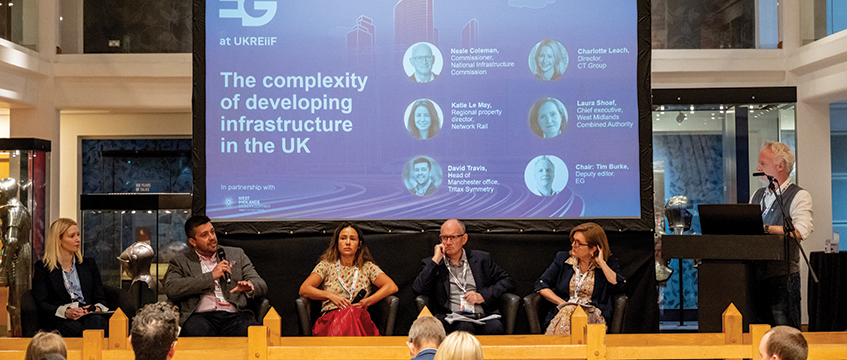“Make or break” – that is how last month’s progress review from the National Infrastructure Commission described this moment for the long-term prospects for infrastructure delivery in the UK. Speaking just hours before prime minister Rishi Sunak called a general election for early July, a group of panellists gathered by EG at the UKREiiF conference in Leeds debated what the country’s leaders need to do to be sure this pivotal moment is grasped for the good.
“In almost all areas of economic infrastructure, there are very big challenges ahead,” said Neale Coleman, commissioner at the National Infrastructure Commission. “That’s whether you are talking about transport, whether you are talking about the net-zero space, where commitments are needed.
“The majority of the spend on economic infrastructure over the next 20 to 30 years is going to have to come from the private sector. For the private sector to make that sort of investment, it needs to be certain about plans, it needs to have stability, it needs to know decisions will be made quickly, and it needs to know when they are going to be committed to for the long term.”
Coleman continued: “Frankly, that is not the case at the moment. It doesn’t matter where you look, there have been a number of recent decisions – particularly those around HS2 – which have really created a lot of concern that it is difficult to create the stable environment we need for private investment.”
Caught in the cycle
Charlotte Leach, director at CT Group, spends her days tackling the “politics of planning” and how they affect decisions made by the consultancy’s clients. When it comes to planning reform, talk has rarely been followed by action.
“We are all aware of how political planning can be and the time it takes to bring forward major projects,” Leach said.
“You have the real challenge of needing to make long-term plans, but also that political election cycles are far more regular, and a lot of projects get caught up in election cycles, which is ultimately counterproductive and stifles progress, meaning these projects are taking far longer than they should to come forward.”
She added: “There’s lot of talk about planning reform. Whether or not it actually happens remains to be seen. The current government has talked a lot about it and there was a lot of political pushback.”
David Travis, head of the Manchester office at Tritax Symmetry, believes the kind of big box logistics developments the company’s REITs have should be viewed as infrastructure as well as real estate.
“What do we need as an industry? Certainty, longevity and for infrastructure to stop being used as a political football,” he said.
“The Northern Powerhouse has come and gone. The levelling-up agenda has come and gone. What’s next? I was a staunch supporter of HS2 and the northern legs have been cancelled. Everything I do is legacy, I’ve spent a long time in the regeneration game. There’s been a lot of soundbites about balancing up infrastructure, but HS2 being cancelled. That’s billions of pounds of investment in infrastructure in the north that I don’t think will ever come back.”
Changing position
As became a regular refrain at the conference, panellists urged a more forward-looking focus on relationship building between private and public sector players. For a company such as Network Rail, the complexity of putting together deals alongside its land holdings is immense. Katie Le May is a regional property director who oversees the line from London’s Euston to Carlisle, and says the company knows it needs to evolve.
“Network Rail has always had a bit of a reputation of being quite hard to deal with, due to that complexity,” she said.
“I don’t disagree with that, but I think slowly Network Rail and certainly Network Rail Property is starting to change its position. Where we have been quite transactional, selling land to facilitate development, we are now looking much more at working collaboratively with the public and private sector.
“We have eight joint ventures with the private sector and 20 strategic alliances in place.”
But these tie-ups mean little without political stability. Conference attendees will now hope the summer election provides that too.
“There are two words I’ve heard wherever I go at UKREiiF. One is ‘partnerships’ and the other is ‘certainty’,” said Laura Shoaf, chief executive of the West Midlands Combined Authority.
“If this conference needs to land a message with government, it has got to be that the partnerships are in place but the certainty is not. Without that kind of certainty it makes it difficult for all the professionals here to do their job properly.”
The experts
- Neale Coleman, commissioner, National Infrastructure Commission
- Charlotte Leach, director, CT Group
- Katie Le May, regional property director, Network Rail
- Laura Shoaf, chief executive, West Midlands Combined Authority
- David Travis, head of Manchester office, Tritax Symmetry
In partnership with:
Photo © JMA Photography
Send feedback to Tim Burke
Follow Estates Gazette












